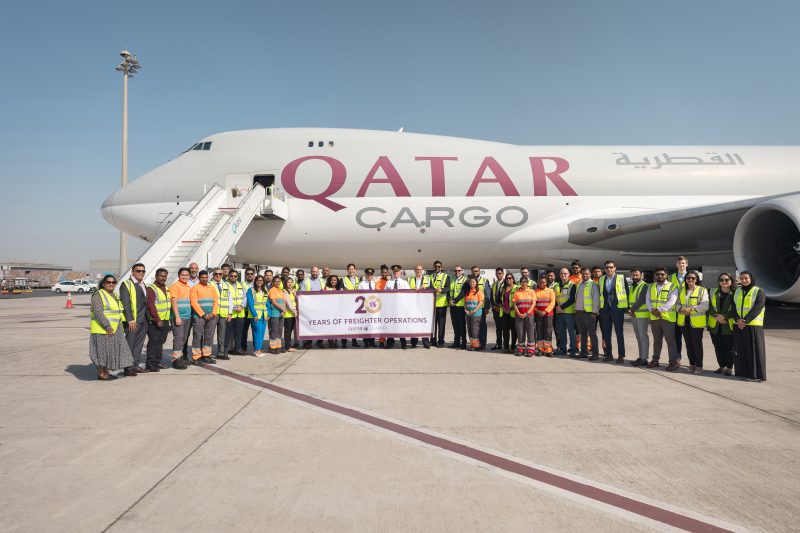Qatar Airways Cargo: Two decades of excellence in air freight
Doha, Qatar—Qatar Airways Cargo has evolved and grown into the world’s leading air cargo carrier, with an extensive fleet and a robust network. To commemorate this remarkable journey, the carrier reflects on its major achievements and innovations.
In 2003, Qatar Airways Cargo took delivery of its very first freighter, an Airbus A300-600, which was a converted passenger aircraft. It began regular operations to Amsterdam and Chennai, and shortly thereafter, to New Delhi. Today, the cargo airline operates to more than 160 belly-hold and over 70 freighter destinations with over 200 passenger aircraft and 31 dedicated cargo freighters.
Elisabeth Oudkerk, Senior Vice-President, Cargo Sales and Network Planning, expressed her joy and gratitude, stating: “As Qatar Airways Cargo celebrates 20 years of freighter operations, we extend our heartfelt thanks to our customers for their continuous trust in our services. We take immense pride in our history and anticipate contributing to the promising future of air freight.”
Over the past two decades, Qatar Airways Cargo has continuously expanded its fleet, network, and product portfolio, becoming the world’s number one cargo carrier. With the launch of its Next Generation strategy, Qatar Airways Cargo has defined its role in the air cargo industry by bringing a fresh and innovative approach to business across its network and operations: through enhanced products and services, cutting-edge technology, a commitment to sustainability, and diversity, investing in existing talent and attracting new ones.
Under the complete corporate mindset shift that is The Next Generation, Qatar Airways Cargo has achieved significant accomplishments including being the first airline globally to complete the suite of IATA CEIV certifications, the launch of the Kigali Africa hub in partnership with RwandAir, and the introduction of innovative products like Pharma, Fresh, Courier, and SecureLift.
Furthermore, Qatar Airways Cargo’s commitment to customer experience and innovation has made it a preferred partner for businesses worldwide. Having embraced digital transformation early, it has successfully launched its new website and a state-of-the-art ebooking portal Digital Lounge, and partnered with marketplace platforms, bringing added value to its customers. Additionally, Qatar Airways Cargo has committed to sustainability through its WeQare program, championing initiatives such as ‘Rewild the planet’ and launching a CO2 emission calculator.
As Qatar Airways Cargo enters its next decade, it remains dedicated to digitalization and sustainability and looks forward to continuing being at the forefront of air cargo’s innovation and customer-centric solutions.
To celebrate 20 years of freighter operations, Qatar Airways Cargo has launched a timeline of its history which can be viewed here: https://www.qrcargo.com/s/company/our-history
Meanwhile, the cargo carrier also announced it is expanding its China in two major cities. It launched its belly-hold flights Chengdu (TFU) and Chongqing (CKG) on 23rd and 25th of September, respectively.
Both these destinations, served three times a week by Airbus A330-300 aircraft will further enhance Qatar Airways Cargo’s global network. These strategic additions will play a crucial role in facilitating international trade, bridging China with the rest of the world.
Elisabeth Oudkerk, SVP Cargo Sales and Network Planning said, “Qatar Airways Cargo has been serving the Chinese market since October 2003, when it first started belly hold flights to Shanghai. We are pleased to expand our network in Mainland China with these new destinations and offer our customers direct belly hold capacity for their imports and exports out of these key markets.”
Qatar Airways Cargo already serves several destinations in Mainland China, including Beijing, Guangzhou, Hangzhou, Shanghai, Shenzhen, Zhengzhou offering a combined weekly cargo capacity of more than 2,700 tonnes each way including the newly introduced destinations.
Both Chongqing and Chengdu stations will primarily operate as export-oriented markets, jointly providing a weekly capacity of 84 tonnes each way. Exports will predominantly consist of vulnerable/tech cargo while imports will encompass general cargo, fish and seafood, and perishables.










